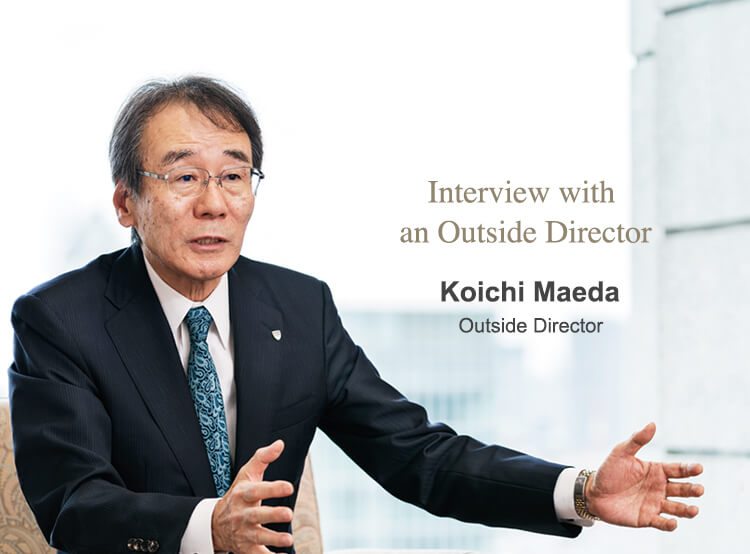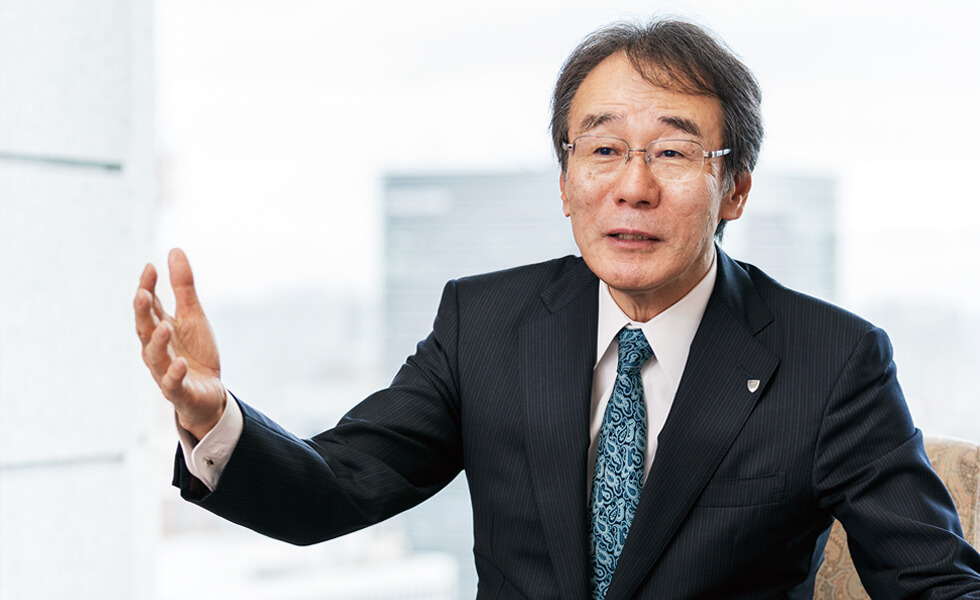
Interview with an Outside Director
Contributing to the Establishment of
a Global-Standard and High-Quality
Governance System
Koichi MaedaOutside Director
Governance system for sustainable growth of the Group
What are the features of the Dai-ichi Life Group governance system?
Three years ago, in October 2016, the Dai-ichi Life Group transitioned to a holding company structure and established an Audit & Supervisory Committee, with the majority of committee members composed of outside directors. I think the main objectives in transitioning to this structure were to allow the Board of Directors of the holding company to flexibly execute business and allocate resources aimed at accelerating the growth of the entire Group based on the future growth strategy. Another aim was to make the Audit & Supervisory Committee responsible for overseeing and supervising the Board of Directors, and for the Board of Directors to clearly demonstrate its monitoring function. This governance design evolved from the prior Group-wide management structure established at The Dai-ichi Life Insurance Company, Limited, the largest operating company in the Group, with sustainable growth in mind. Thus, I think, a solid governance system has been in place since the start of the holding company.
It has been nearly three years since you took office as an outside director. How do you evaluate the evolution of the Group's corporate governance system?
In the early days of the transition to the holding company structure, we went through some trial and error while establishing appropriate roles of the Board of Directors at the executive side and the supervisory side for a holding company rather than for an operating company. However, through our discussions on the formulation of the CONNECT 2020 Medium-Term Management Plan and overseas M&A, I recognized that the Group's solid management system aimed at achieving the Group growth has been strengthened while maintaining an appropriate tension between execution and supervision roles. Also, as a company with an Audit & Supervisory Committee, I think during the three-year period the Dai-ichi Life Group established its own distinctive mechanisms and style with a focus on the supervisory function.
On the other hand, given the changes in the business environment that could take place in the insurance industry, I believe, that the Company should foresee the possibilities and leverage the advantages of being a holding company more than ever and develop flexible measures for sustainable growth. I also think that further development and improvement of governance system in Japan and overseas will become essential for future business expansion.
Enhancing Board of Directors effectiveness through constructive discussions from diverse viewpoints
Could you explain the composition of the outside directors?
Seven out of 16 members of the Company's Board of Directors are outside directors. The backgrounds of the outside directors are diverse, being made up of people with a high level of insight and extensive experience in a variety of expert fields such as corporate management, finance, and law. I think that there is an extremely well-balanced selection of board members in the sense of being able to evaluate and judge the Dai-ichi Life Group's various strategies in Japan and overseas from the required diverse standpoints.
In what ways do the outside directors take part in the discussions at the Board of Directors?
There is vigorous discussion incorporating the diverse knowledge of the outside directors at each Board of Directors meeting. Very frequently outside directors express their opinions, and I feel that the deliberation and constructive discussion from diverse standpoints have led to the enhancement of the Board of Directors effectiveness.
In addition, outside directors have raised various issues to enhance further Board of Directors effectiveness, which I think is leading to continuous improvements, such as the establishment of a follow up system on Board of Directors discussions, strengthening coordination between each committee and the Board of Directors, and provision of feedback on discussions in executive departments.
Providing information to the outside directors is significant and forms the precondition for these vigorous discussions. Apart from the shared materials and briefings prior to the Board of Directors meetings, information is also provided in different ways, including seminars on management issues, internal events, visits to business sites in various places. In fiscal 2018, we visited Dai-ichi Life Vietnam to exchange opinions with the management. There we also visited a sales office and clearly recognized that the knowledge and know-how accumulated in Japan was utilized by highly motivated local employees. Visiting business operations, including overseas locations, and having first-hand experience on the Company's business is extremely meaningful, and I think that it deepens our discussions at the Board of Directors.
Please explain the Nominations Advisory Committee and the Remuneration Advisory Committee.
I serve as the chairman of the Nominations Advisory Committee and the Remuneration Advisory Committee. Both committees endeavor to make decisions through discussions that consider the perspectives of stakeholders, particularly shareholders, based on the clear background, concerning points, and challenges related to the decision matter. In addition, to enhance communication between the committees and the Board of Directors, since fiscal 2018, I have been reporting the main discussion points from both committees to the Board of Directors and plan to continue enhancing such collaboration. In addition, in fiscal 2018, the Remuneration Advisory Committee decided to revise the performance-linked remuneration scheme by introducing restricted stock remuneration. This scheme aims to incentivize directors through making officers' responsibility more explicit for the Company's performance and share price. Among other matters, the Nominations Advisory Committee discussed the ideal composition of the Board of Directors, and going forward we plan to deepen our discussions on matters such as succession planning.
Advancing efforts on both tangible institutional frameworks and intangible human capital to support overseas expansion
Please explain the governance system relating to overseas M&A.
Up until now, the Group has capitalized on the advantages of the holding company structure to steadily promote its growth strategy, including M&A. Recently, there have been several major M&As at the Company's overseas businesses. Protective Life acquired in-force blocks from Liberty Life Assurance Company of Boston and Great-West Life & Insurance Annuity Company. And TAL acquired Suncorp's life insurance business. The institutional frameworks for promoting such international M&A, such as due diligence, capital management, and risk management, are well established, and the outside directors were also involved in the discussions from an early stage.
Moreover, with the similar importance as with acquisitions proposals, I also focus on the progress of post-merger integration (PMI). I think that confirming whether the original objectives of an acquisition have been achieved, including on what processes the integration is promoted and when the results will appear, are useful for decision making when new M&A projects are proposed.
What are the important concerns for promoting further overseas expansion?

When talking with overseas life insurance business local management, I get the sense of willingness to understand the Dai-ichi Life Group's values and culture along with a positive attitude toward contributing to the Group. To succeed in the overseas life insurance business, I think, it is extremely important to build up these kind of intangible efforts directed at alignment of corporate cultures in addition to the tangible efforts in terms of governance.
The life insurance business is a local business based on laws and regulations and the social security systems in each country. However, I believe there are many aspects such as know-how and systems that the Dai-ichi Life Group has cultivated in Japan and can be shared globally. Therefore, the Company has established the Global Leaders' Committee, which brings together the management of overseas Group companies, to share the policy, philosophy, and knowledge of the Dai-ichi Life Group. It has also launched the Group Initiative Taskforce, which aims to enhance collaboration and resolve issues on an operational level. It may take time, but I believe that building connections between people and sharing corporate culture through such frameworks is a very positive measure for the Group.

Supporting Group initiatives that contribute to improvement of QOL
As an outside director, how do you plan to support Company initiatives for improving QOL?
The Dai-ichi Life Group stated in CONNECT 2020, the medium-term management plan, that it will contribute to the improvement of Quality of Life. Essentially, the life insurance business, with its contributions to the stability of people's lifestyles, is a business with strong social aspect. In addition to this Group is trying to enhance its contributions in areas such as assets building and promoting health, and also ensuring sustainable community and social continuity. I believe that this is an extremely meaningful challenge in the sense that the Group will use its strengths as a company with a mission of "By your side, for life" to meet evolving customer needs based on a sound understanding of the business environment.
I think it is a sign that Group is not only providing protection and paying insurance benefits promptly, but also evolving into a company that is closer to customers, through initiatives such as health promotion, solving more diverse social issues by providing more value to customers through utilization of digital technology and establishing diverse partnerships.
While more sophisticated environment changes are expected, decision making on such initiatives needs to be unconventional, fair and just, as well as more flexible and speedier than ever before. Similarly, it is expected that more refined frameworks at a global standard will also be required for the Group's governance.
Further development in these areas will be the Group's challenge for achieving sustainable growth. As an outside director, I would continuously consider what is necessary for such development and would contribute to leveraging the advantages of being a holding company.

